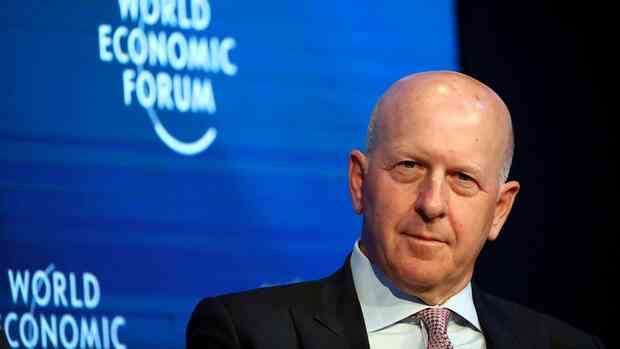new York Goldman Sachs CEO David Solomon earned around 30 percent less last year and is thus drawing conclusions from a turbulent year for the renowned Wall Street house. The bank laid off a good 3,000 employees – that was the largest wave of layoffs since the financial crisis.
Net income was about 50 percent below that of the record year 2021. Solomon’s base salary was $2 million and variable compensation was $23 million, according to a mandatory filing with the Securities and Exchange Commission on Friday. In 2021 he still took home $35 million and was one of the highest paid bank bosses.
Overall, Goldman underperformed its peers this year. The push into private banking was significantly more expensive and less lucrative than originally thought and is now being scaled back, as Solomon announced last year. It is essentially about the online bank “Marcus” and the credit card business. As a result, Solomon took a bigger discount than other bank CEOs.
The bank intends to announce details of its strategy for this year at the Investors’ Day on February 28th. Octavio Marenzi from the capital market consultancy Opimas assumes that further cuts at Goldman could be pending. The bank’s costs have risen significantly, “while revenues have collapsed. This strongly suggests that further cost cutting and layoffs are on the way.”
Top jobs of the day
Find the best jobs now and
be notified by email.
Possible comeback in mergers and acquisitions
Jim Esposito, co-head of the important Global Banking and Markets division, said he was confident about the bank’s core business in an interview with the Handelsblatt. “Goldman Sachs’ fundamentals are strong and we have a very good market position for the years to come,” said Esposito, whose division has combined investment banking and trading.
Above all, trading in fixed-income securities went well last year and posted the second-highest turnover of all. In the mergers and acquisitions (M&A) business, Goldman was number one, as the bank announced when it presented its quarterly figures in mid-January.
>> Read here: JP Morgan reportedly wants to invest in Italian soccer league Serie A
Despite the difficult market environment, Esposito also sees growth opportunities for this year. The area experienced a setback in the past year. The boom in the M&A market has ended for the time being due to the rapid rise in key interest rates of the US Federal Reserve (Fed) and concerns about a recession in the USA and the consequences of the war in Ukraine.
However, the Goldman manager believes that the mood could change again soon. For this, however, private equity houses would have to get more involved again. In view of the high interest rates, debt-financed deals have become less attractive. Banks have also been increasingly reluctant to finance these deals and in some cases have not been able to resell loans to investors as planned.
But the situation is much better than it was during the 2008 financial crisis. “It doesn’t take much for the risk-on mood to return to this market. We’re not quite there yet, but I’m seeing the first positive signs,” said Esposito.
Overall, Goldman Sachs underperformed its peers this year.
(Photo: Reuters)
There could also be another indication in the coming week after the Fed’s interest rate decision. Economists expect that interest rates will only rise by a quarter of a percentage point and thus significantly more slowly than last year. The Fed raised interest rates at record speed to a range of 4.25 to 4.5 percent. In Europe, the key interest rate is 2.5 percent.
IPOs are missing
Meanwhile, companies remain interested in transactions, Esposito said. “The pressure to consolidate is high. This applies to practically all industries.” Many companies are in the process of reorganizing their supply chains and becoming less dependent on China in the process. That too would increase the need for mergers and acquisitions. Esposito, on the other hand, is less confident about a comeback of IPOs.
A large chunk of the IPO market in 2020 and 2021 “has been driven by technology companies, and some firms are significantly off the value they went public at,” the veteran investment banker said. Therefore, the enthusiasm of investors is curbed.
The once-hyped unicorns from Silicon Valley, tech start-ups valued at over one billion dollars, have caused serious losses in investors’ portfolios. Crypto exchange Coinbase, for example, which went public in 2021 with Goldman’s help, has since lost 85 percent in value. The losses at the electric car manufacturer Rivian look similar. The delivery service Doordash, which went public at the end of 2020, is around 68 percent in the red.
The shining exception last year was the IPO of the Stuttgart car manufacturer Porsche, in which Goldman Sachs was also involved. In contrast to many tech companies, however, it was “a well-managed company with a strong business model”.
More: Goldman Sachs profits slump, Morgan Stanley beats expectations
